CS215 Tutorial (Week 3): Analyzing Fee and Stuart's Biblical Views
VerifiedAdded on 2021/04/17
|5
|1034
|382
Homework Assignment
AI Summary
This assignment is a tutorial for CS215, focusing on biblical interpretation according to Fee and Stuart's "How to Read the Bible for All Its Worth." It explores the concept of "eternal relevance" and "historical particularity," emphasizing the importance of understanding the context in which biblical texts were written. The tutorial explains exegesis as the first task of an interpreter and the key to good exegesis, which involves careful reading and asking contextual and content-related questions. It discusses the historical and literary contexts, and lists tools like translations, dictionaries, and commentaries. The process of hermeneutics is explained, as well as why exegesis is a necessary first step. The student provides a short journal entry summarizing the process of interpreting scriptures, including exegesis and hermeneutics, and the tools used.
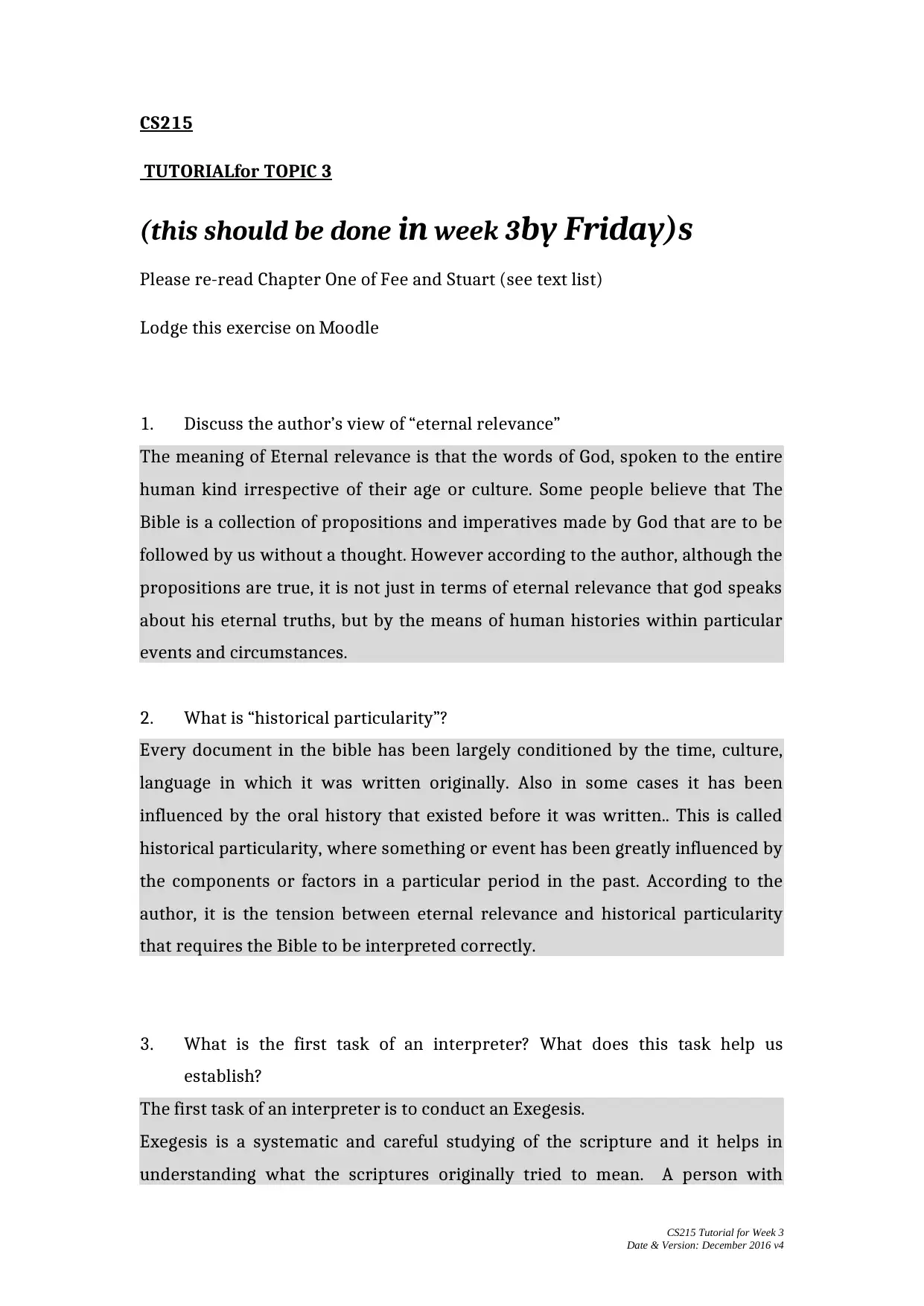
CS215
TUTORIALfor TOPIC 3
(this should be done in week 3by Friday)s
Please re-read Chapter One of Fee and Stuart (see text list)
Lodge this exercise on Moodle
1. Discuss the author’s view of “eternal relevance”
The meaning of Eternal relevance is that the words of God, spoken to the entire
human kind irrespective of their age or culture. Some people believe that The
Bible is a collection of propositions and imperatives made by God that are to be
followed by us without a thought. However according to the author, although the
propositions are true, it is not just in terms of eternal relevance that god speaks
about his eternal truths, but by the means of human histories within particular
events and circumstances.
2. What is “historical particularity”?
Every document in the bible has been largely conditioned by the time, culture,
language in which it was written originally. Also in some cases it has been
influenced by the oral history that existed before it was written.. This is called
historical particularity, where something or event has been greatly influenced by
the components or factors in a particular period in the past. According to the
author, it is the tension between eternal relevance and historical particularity
that requires the Bible to be interpreted correctly.
3. What is the first task of an interpreter? What does this task help us
establish?
The first task of an interpreter is to conduct an Exegesis.
Exegesis is a systematic and careful studying of the scripture and it helps in
understanding what the scriptures originally tried to mean. A person with
CS215 Tutorial for Week 3
Date & Version: December 2016 v4
TUTORIALfor TOPIC 3
(this should be done in week 3by Friday)s
Please re-read Chapter One of Fee and Stuart (see text list)
Lodge this exercise on Moodle
1. Discuss the author’s view of “eternal relevance”
The meaning of Eternal relevance is that the words of God, spoken to the entire
human kind irrespective of their age or culture. Some people believe that The
Bible is a collection of propositions and imperatives made by God that are to be
followed by us without a thought. However according to the author, although the
propositions are true, it is not just in terms of eternal relevance that god speaks
about his eternal truths, but by the means of human histories within particular
events and circumstances.
2. What is “historical particularity”?
Every document in the bible has been largely conditioned by the time, culture,
language in which it was written originally. Also in some cases it has been
influenced by the oral history that existed before it was written.. This is called
historical particularity, where something or event has been greatly influenced by
the components or factors in a particular period in the past. According to the
author, it is the tension between eternal relevance and historical particularity
that requires the Bible to be interpreted correctly.
3. What is the first task of an interpreter? What does this task help us
establish?
The first task of an interpreter is to conduct an Exegesis.
Exegesis is a systematic and careful studying of the scripture and it helps in
understanding what the scriptures originally tried to mean. A person with
CS215 Tutorial for Week 3
Date & Version: December 2016 v4
Paraphrase This Document
Need a fresh take? Get an instant paraphrase of this document with our AI Paraphraser
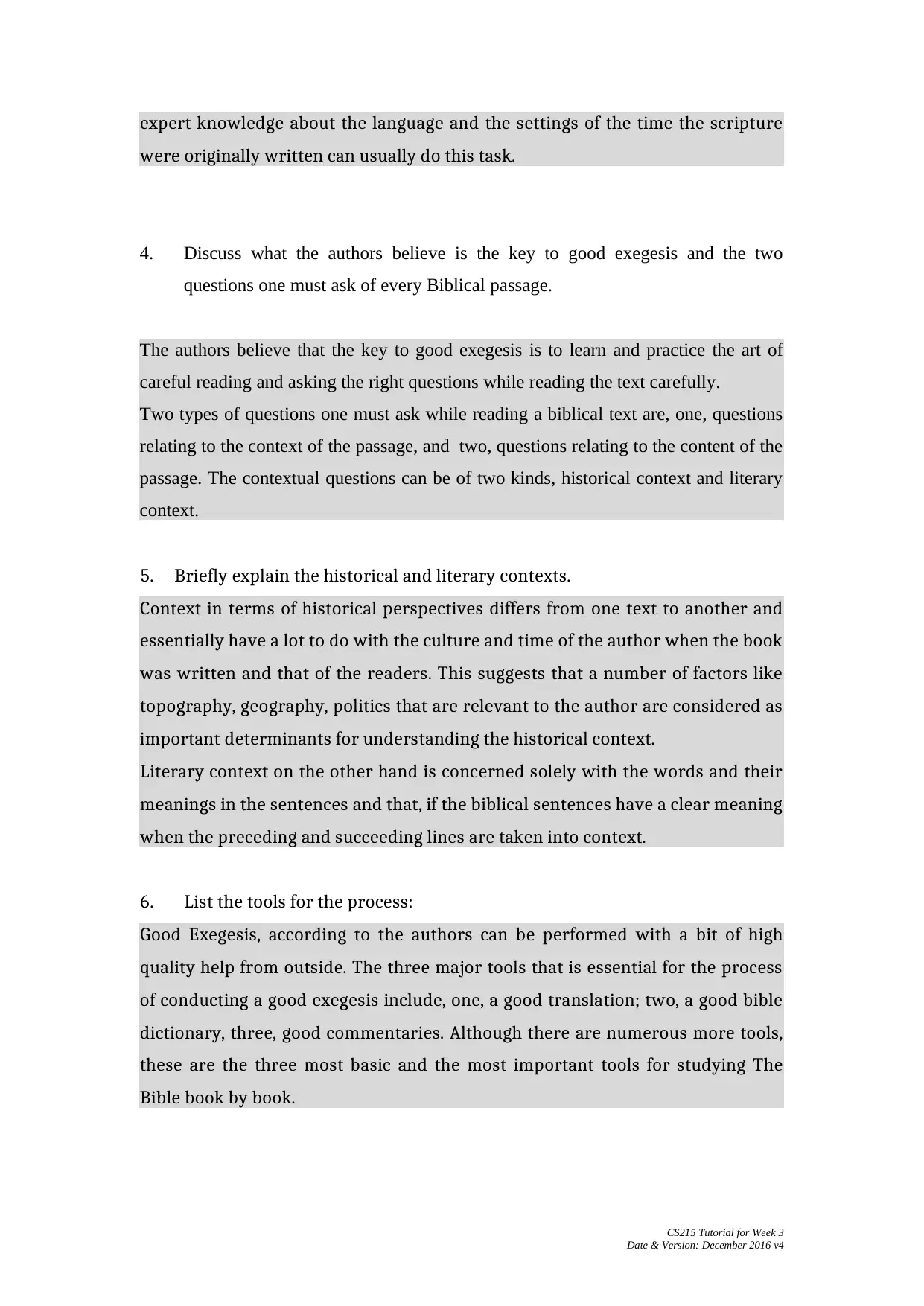
expert knowledge about the language and the settings of the time the scripture
were originally written can usually do this task.
4. Discuss what the authors believe is the key to good exegesis and the two
questions one must ask of every Biblical passage.
The authors believe that the key to good exegesis is to learn and practice the art of
careful reading and asking the right questions while reading the text carefully.
Two types of questions one must ask while reading a biblical text are, one, questions
relating to the context of the passage, and two, questions relating to the content of the
passage. The contextual questions can be of two kinds, historical context and literary
context.
5. Briefly explain the historical and literary contexts.
Context in terms of historical perspectives differs from one text to another and
essentially have a lot to do with the culture and time of the author when the book
was written and that of the readers. This suggests that a number of factors like
topography, geography, politics that are relevant to the author are considered as
important determinants for understanding the historical context.
Literary context on the other hand is concerned solely with the words and their
meanings in the sentences and that, if the biblical sentences have a clear meaning
when the preceding and succeeding lines are taken into context.
6. List the tools for the process:
Good Exegesis, according to the authors can be performed with a bit of high
quality help from outside. The three major tools that is essential for the process
of conducting a good exegesis include, one, a good translation; two, a good bible
dictionary, three, good commentaries. Although there are numerous more tools,
these are the three most basic and the most important tools for studying The
Bible book by book.
CS215 Tutorial for Week 3
Date & Version: December 2016 v4
were originally written can usually do this task.
4. Discuss what the authors believe is the key to good exegesis and the two
questions one must ask of every Biblical passage.
The authors believe that the key to good exegesis is to learn and practice the art of
careful reading and asking the right questions while reading the text carefully.
Two types of questions one must ask while reading a biblical text are, one, questions
relating to the context of the passage, and two, questions relating to the content of the
passage. The contextual questions can be of two kinds, historical context and literary
context.
5. Briefly explain the historical and literary contexts.
Context in terms of historical perspectives differs from one text to another and
essentially have a lot to do with the culture and time of the author when the book
was written and that of the readers. This suggests that a number of factors like
topography, geography, politics that are relevant to the author are considered as
important determinants for understanding the historical context.
Literary context on the other hand is concerned solely with the words and their
meanings in the sentences and that, if the biblical sentences have a clear meaning
when the preceding and succeeding lines are taken into context.
6. List the tools for the process:
Good Exegesis, according to the authors can be performed with a bit of high
quality help from outside. The three major tools that is essential for the process
of conducting a good exegesis include, one, a good translation; two, a good bible
dictionary, three, good commentaries. Although there are numerous more tools,
these are the three most basic and the most important tools for studying The
Bible book by book.
CS215 Tutorial for Week 3
Date & Version: December 2016 v4
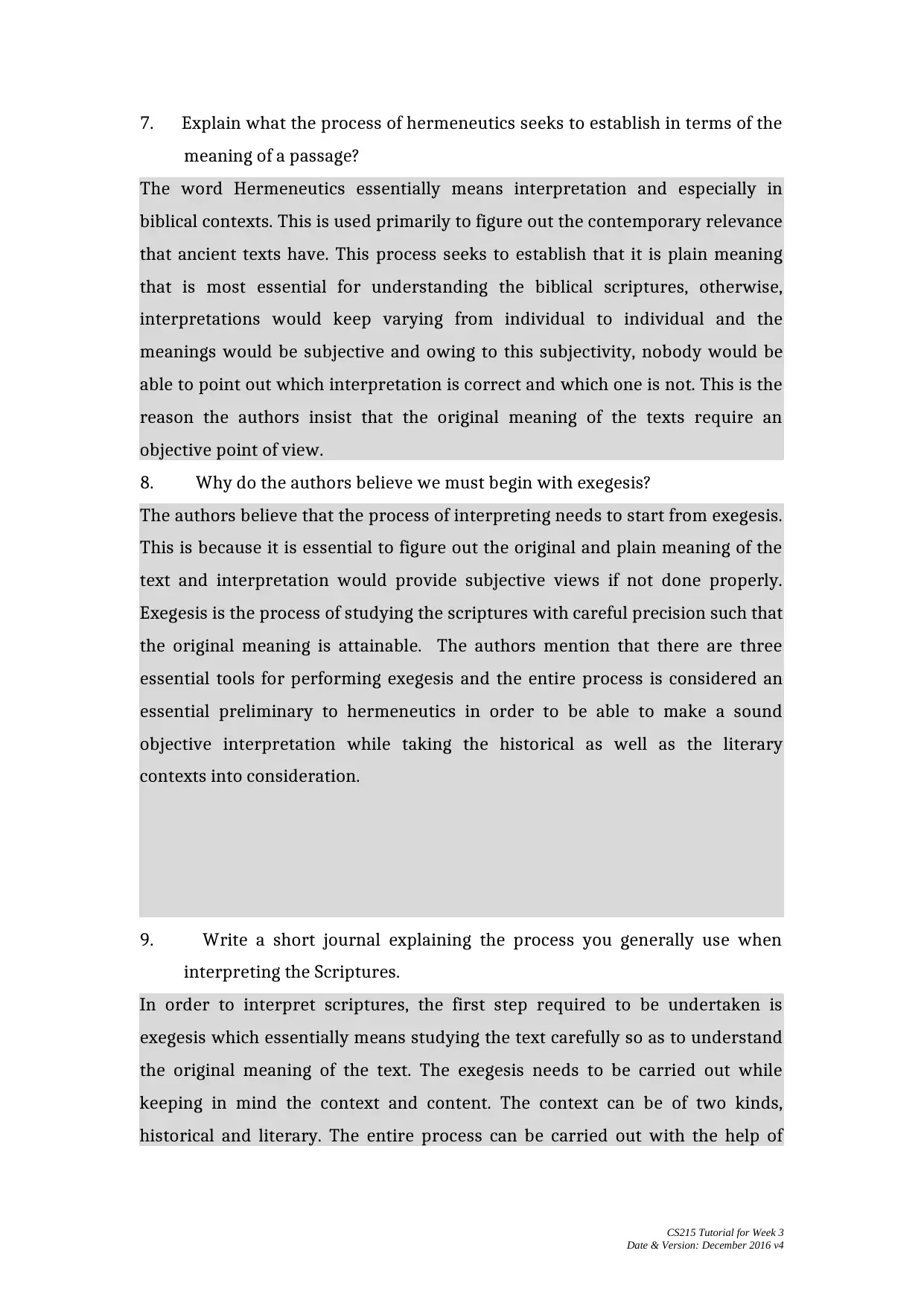
7. Explain what the process of hermeneutics seeks to establish in terms of the
meaning of a passage?
The word Hermeneutics essentially means interpretation and especially in
biblical contexts. This is used primarily to figure out the contemporary relevance
that ancient texts have. This process seeks to establish that it is plain meaning
that is most essential for understanding the biblical scriptures, otherwise,
interpretations would keep varying from individual to individual and the
meanings would be subjective and owing to this subjectivity, nobody would be
able to point out which interpretation is correct and which one is not. This is the
reason the authors insist that the original meaning of the texts require an
objective point of view.
8. Why do the authors believe we must begin with exegesis?
The authors believe that the process of interpreting needs to start from exegesis.
This is because it is essential to figure out the original and plain meaning of the
text and interpretation would provide subjective views if not done properly.
Exegesis is the process of studying the scriptures with careful precision such that
the original meaning is attainable. The authors mention that there are three
essential tools for performing exegesis and the entire process is considered an
essential preliminary to hermeneutics in order to be able to make a sound
objective interpretation while taking the historical as well as the literary
contexts into consideration.
9. Write a short journal explaining the process you generally use when
interpreting the Scriptures.
In order to interpret scriptures, the first step required to be undertaken is
exegesis which essentially means studying the text carefully so as to understand
the original meaning of the text. The exegesis needs to be carried out while
keeping in mind the context and content. The context can be of two kinds,
historical and literary. The entire process can be carried out with the help of
CS215 Tutorial for Week 3
Date & Version: December 2016 v4
meaning of a passage?
The word Hermeneutics essentially means interpretation and especially in
biblical contexts. This is used primarily to figure out the contemporary relevance
that ancient texts have. This process seeks to establish that it is plain meaning
that is most essential for understanding the biblical scriptures, otherwise,
interpretations would keep varying from individual to individual and the
meanings would be subjective and owing to this subjectivity, nobody would be
able to point out which interpretation is correct and which one is not. This is the
reason the authors insist that the original meaning of the texts require an
objective point of view.
8. Why do the authors believe we must begin with exegesis?
The authors believe that the process of interpreting needs to start from exegesis.
This is because it is essential to figure out the original and plain meaning of the
text and interpretation would provide subjective views if not done properly.
Exegesis is the process of studying the scriptures with careful precision such that
the original meaning is attainable. The authors mention that there are three
essential tools for performing exegesis and the entire process is considered an
essential preliminary to hermeneutics in order to be able to make a sound
objective interpretation while taking the historical as well as the literary
contexts into consideration.
9. Write a short journal explaining the process you generally use when
interpreting the Scriptures.
In order to interpret scriptures, the first step required to be undertaken is
exegesis which essentially means studying the text carefully so as to understand
the original meaning of the text. The exegesis needs to be carried out while
keeping in mind the context and content. The context can be of two kinds,
historical and literary. The entire process can be carried out with the help of
CS215 Tutorial for Week 3
Date & Version: December 2016 v4
⊘ This is a preview!⊘
Do you want full access?
Subscribe today to unlock all pages.

Trusted by 1+ million students worldwide
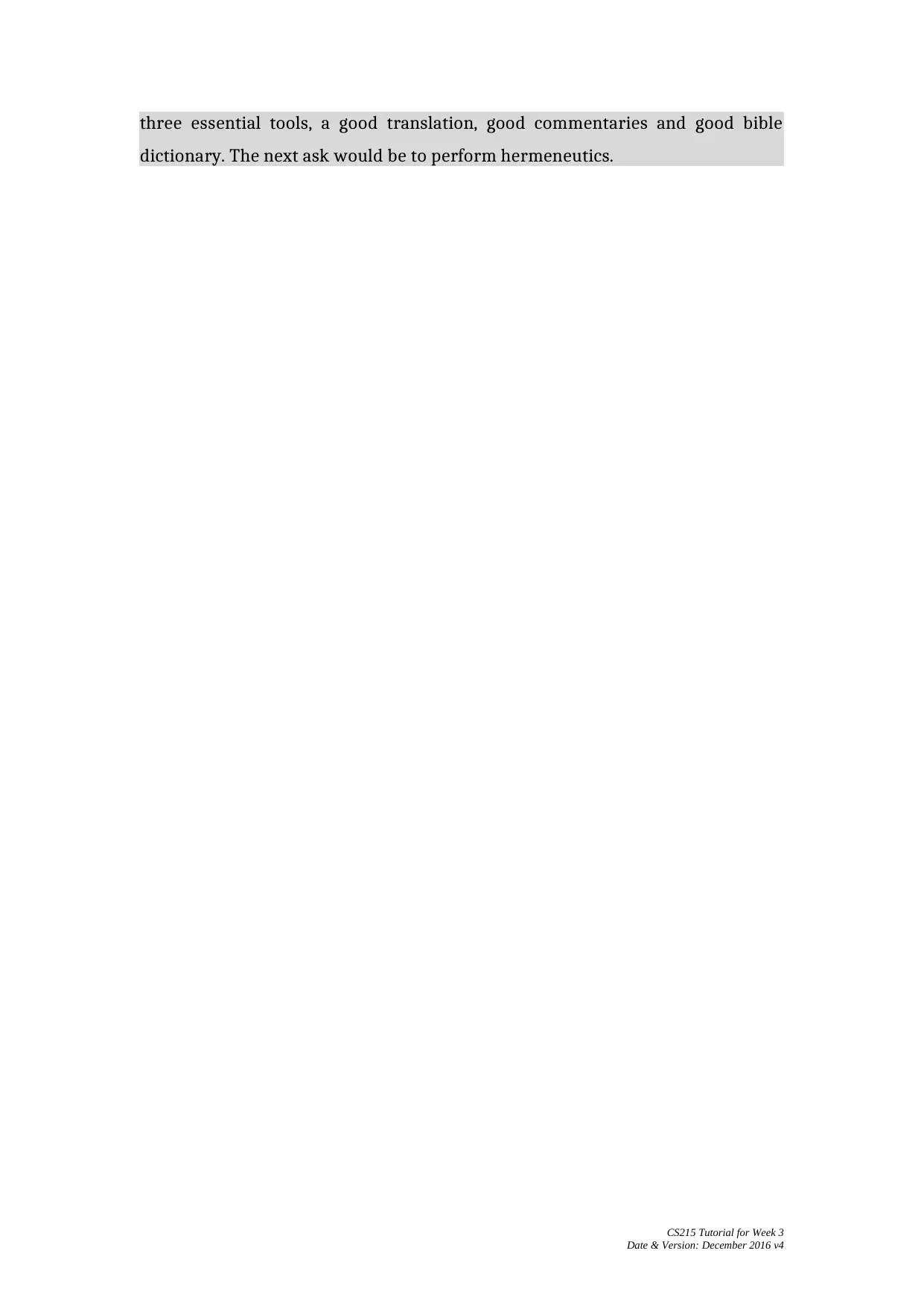
three essential tools, a good translation, good commentaries and good bible
dictionary. The next ask would be to perform hermeneutics.
CS215 Tutorial for Week 3
Date & Version: December 2016 v4
dictionary. The next ask would be to perform hermeneutics.
CS215 Tutorial for Week 3
Date & Version: December 2016 v4
Paraphrase This Document
Need a fresh take? Get an instant paraphrase of this document with our AI Paraphraser
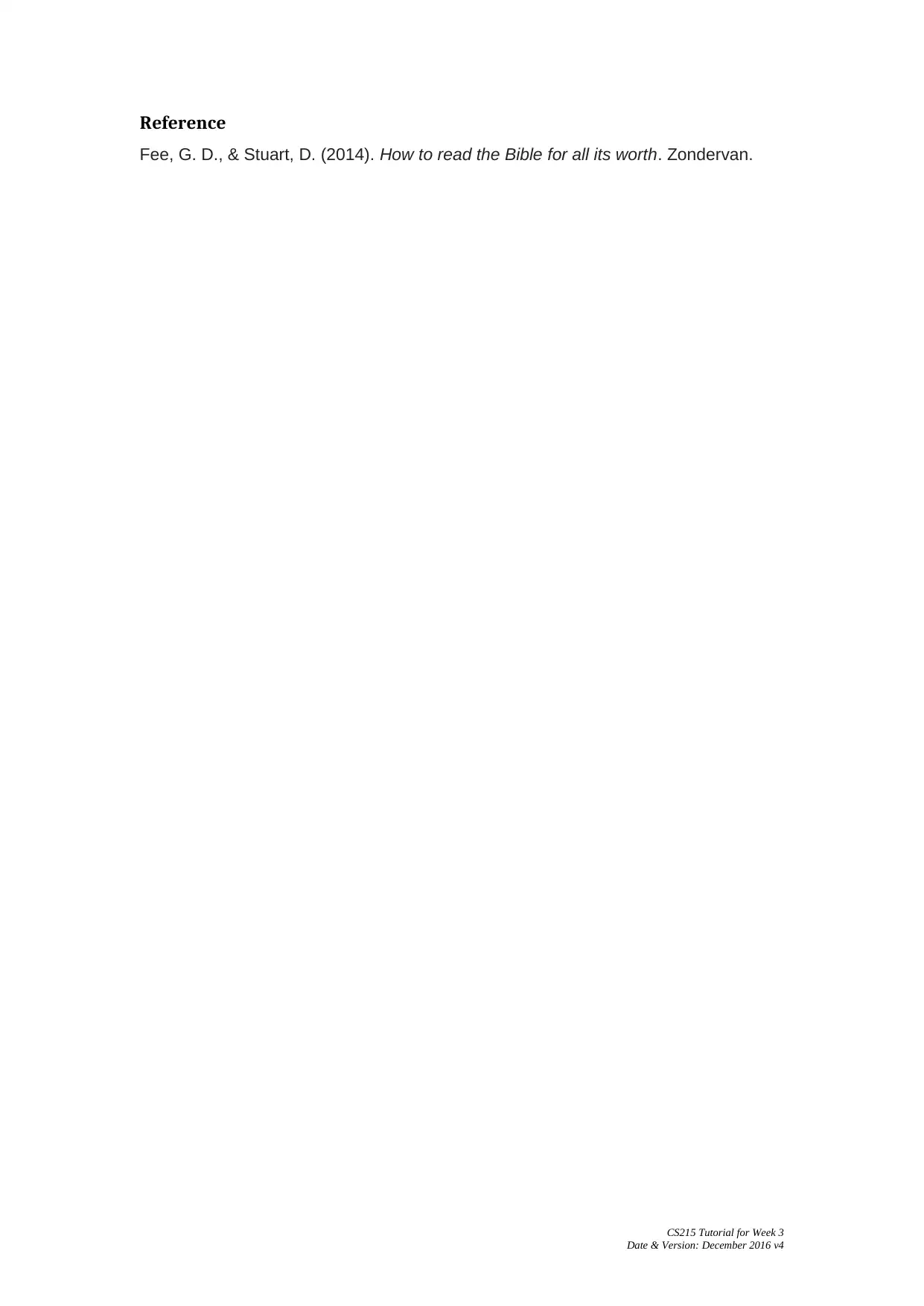
Reference
Fee, G. D., & Stuart, D. (2014). How to read the Bible for all its worth. Zondervan.
CS215 Tutorial for Week 3
Date & Version: December 2016 v4
Fee, G. D., & Stuart, D. (2014). How to read the Bible for all its worth. Zondervan.
CS215 Tutorial for Week 3
Date & Version: December 2016 v4
1 out of 5
Related Documents
Your All-in-One AI-Powered Toolkit for Academic Success.
+13062052269
info@desklib.com
Available 24*7 on WhatsApp / Email
![[object Object]](/_next/static/media/star-bottom.7253800d.svg)
Unlock your academic potential
Copyright © 2020–2026 A2Z Services. All Rights Reserved. Developed and managed by ZUCOL.





